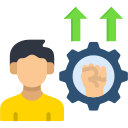Volunteering as a Pathway to Skill Acquisition: Learn, Give, Grow
Why Volunteering Accelerates Skill Building
01
Communication, leadership, problem-solving, and empathy grow quickly when you facilitate meetings, coordinate events, or navigate sensitive conversations. These moments forge agility and resilience, making your learning sticky, memorable, and directly applicable across roles and industries.
02
From CRM tools and data entry to budgeting, logistics, basic design, and first aid, volunteer roles expose you to practical systems. Repetition under gentle stakes builds muscle memory, letting you experiment safely while still producing valuable outcomes for the community.
03
Maya joined a literacy nonprofit to help on weekends and ended up running a pilot reading program. She learned curriculum design, stakeholder communication, and data tracking, then negotiated a promotion at work by showcasing concrete results from her volunteer experience.

Find the Right Opportunity to Match Your Roadmap
Explore local nonprofits, mutual aid groups, open-source organizations, and civic tech platforms. Review mission fit, role clarity, mentorship access, and tools used. Favor teams that value learning and can articulate impact metrics you can help improve.
Turn Volunteer Work into a Skills Portfolio
Record numbers that matter: funds raised, attendance growth, response times reduced, process steps saved, or satisfaction ratings improved. Tie each metric to the skills you practiced, creating a compelling bridge between contribution and capability.

Turn Volunteer Work into a Skills Portfolio
Save planning docs, dashboards, checklists, and meeting notes. Add short retrospectives explaining decisions and lessons learned. Process evidence shows how you think, collaborate, and adapt—insight that employers and collaborators value immensely.
Translate Volunteer Experience into Career Momentum
Use strong verbs, clear metrics, and skill tags. Example: Led a five-person volunteer team to launch a community newsletter, increasing subscriber engagement by 47% while developing project management, content strategy, and stakeholder communication skills.
Keep Growing: Reflection, Mentorship, and Sustainability
Run Mini Retrospectives
After projects, ask: What went well? What felt hard? What will I try next time? Write concise notes. Reflection transforms experiences into reusable insights and helps you notice subtle improvements that deserve celebration.
Find Mentors and Peer Circles
Seek experienced volunteers or staff who enjoy teaching. Pair up with peers for co-learning. A supportive circle keeps you accountable, amplifies opportunities, and provides perspective when challenges or self-doubt inevitably appear.
Protect Your Spark
Balance effort with rest. Set clear boundaries and say no when needed. Sustainable service fuels consistent learning, prevents burnout, and keeps your contributions generous, energized, and authentically aligned with your values.

Digital and Micro-Volunteering for Busy Learners
Microtasks, Major Momentum
Translate a page, fix a bug, categorize data, or polish a brief. Small wins compound. You practice clarity, attention to detail, and follow-through—skills employers notice and communities appreciate, even in limited time windows.
Open Source and Civic Tech
Contribute to repositories, documentation, or issue triage. Learn version control, code review etiquette, and collaborative design. Your pull requests and wiki edits double as a living, public portfolio that showcases evolving competence and initiative.
Accessibility and Inclusion by Design
Volunteer projects often serve diverse communities. Practice inclusive writing, alt text, readable layouts, and translation-aware phrasing. Building with accessibility in mind deepens empathy and strengthens your design judgment across platforms and audiences.
